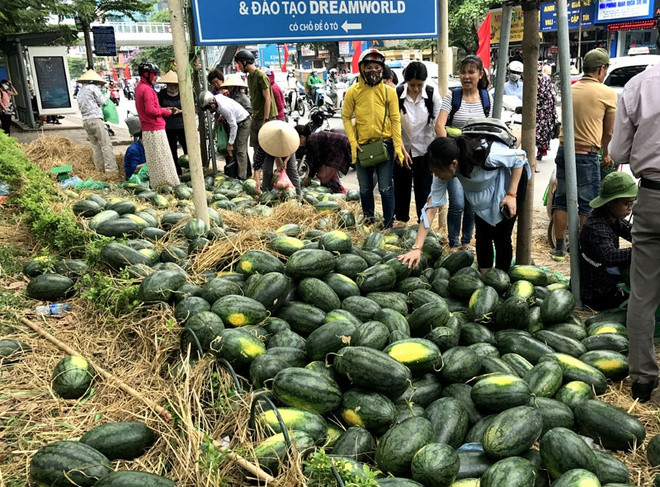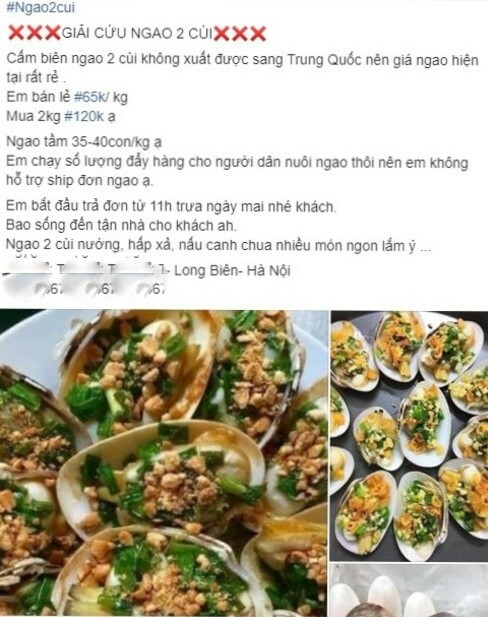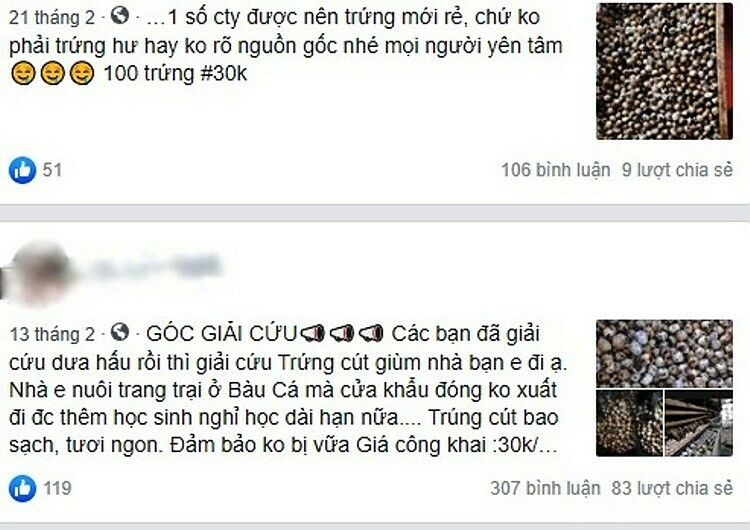Labeling 'rescue' to sell goods at high prices
Quail eggs, grapefruit and many other types of seafood are abused by traders, labeled as "rescued" such as lobster, watermelon, dragon fruit.
Over the past month, the widespread Covid-19 epidemic has caused many Vietnamese agricultural and aquatic products to face difficulties in exporting, pushing prices to rock bottom. Faced with the situation of people suffering many losses, many businesses and individuals have competed to rescue lobsters, watermelons, and dragon fruits and achieved many positive results. However, others have abused the "rescue" to push up the prices of poor quality products at prices that are not really cheap.
Thanks to the continuous call for rescue of clams with the price of 80,000 VND per kg, Ms. Hoa has been selling more customers than in the past two days. The reason she advertised like that is because recently, Quang Ninh clams have been difficult to export to China, so there is a lot of inventory, the price has been reduced by half.
"With the enthusiastic support of buyers, we can sell half a ton of double-shell clams by the end of the week. This type usually costs up to 150,000-160,000 VND per kilogram," Ms. Hoa shared.
|
Clams with two shells are being sold in large numbers for rescue. Photo:Hong Chau |
Thanks to the rescue advertisement of "super big, super giant" ocean oysters at 45,000 VND/kg, Ms. Hang in Nam Dinh sells a ton of oysters every day. "The amount of goods sold is 3 times higher than usual. If the purchase continues like this, the oysters will sell out faster than expected," Ms. Hang said.
Not only seafood is competing to be labeled as rescue, but even quail, grapefruit... are also being complained by many sellers who need help from the community.
Ms. Tran, 2 weeks ago, said that her family's farm's eggs could not be exported to China and needed to be rescued like watermelons. The selling price was 30,000 VND for 100 eggs. Thanks to the word "rescue", Ms. Tran's hundreds of tons of eggs were ordered within the day.
|
Just a short time after being posted for sale, quail eggs were ordered by customers en masse. Photo: Hong Chau. |
Labeled as rescue and advertised as export goods but the selling price and quality of the goods sold are not as advertised. In fact, the price is even higher than normal.
In fact, oysters sold at the warehouses are only 40,000 VND per kilogram, clams are only 50,000-80,000 VND for grade 3 (size over 30). As for quail eggs at the market in Ho Chi Minh City, the price is 1,000 VND for 4 eggs. So with the price of 30,000 VND, customers can buy 120 eggs.
Not only are the prices high, but the quality of the "rescue" products has also been complained about by customers. Many customers said that the advertised products were "super big, giant" but when delivered, customers only received small sized products, the seafood meat was thin and shriveled because it had been left for many days. As for the quail eggs, most of them broke when boiled.
Ms. Loan in District 12 said that she excitedly bought 200 quail eggs to support the cause, but after bringing them home to cook, many of them were rotten, and many of them broke when boiled. "The eggs were not as soft and delicious as I usually buy, so from now on, I will only buy from reputable places," Ms. Loan confided.
Mr. Thanh, the owner of a seafood store on Phan Van Tri Street (Go Vap) said that oysters and clams are products with limited quantities, not as many as other seafood or agricultural products, so there is no need to rescue the goods. Currently, the prices of products that many units sell are even higher than those in many stores. Therefore, customers need to be careful and consider carefully before placing an order.
Talk toPV,Prof. Dr. Vo Tong Xuan - an agricultural expert said that abusing the rescue will set a bad precedent for the agricultural sector. In particular, many subjects take advantage of the rescue to make profits, causing the business environment to decline and product quality to decrease. If this situation continues, farmers will continue to produce poor quality products while consumers will have to use products with a lot of chemicals and residual pesticides.
 |
| Every year agricultural rescue happens. |
Previously, Thaco Chairman Tran Ba Duong also acknowledged that excessive rescue led to the understanding that "agriculture is poor and inferior". In addition, farmers must participate in the business chain according to market mechanisms. When they are aware of this, they can produce according to the linked chain and businesses are ready to protect their partners.
"Doing business and having to wait for rescue is not business," said Mr. Tran Ba Duong.
Mr. Vo Tong Xuan suggested that instead of rescuing farmers, we should let them learn from their experiences and do things more systematically. "At the same time, we should support and encourage farmers to grow cleanly in chains. This way, products can not only be consumed domestically but also exported to many markets instead of just depending on China," said Prof. Dr. Xuan.
The current state of Vietnamese agriculture is that individual households are farming indiscriminately without a plan, while traders are opportunistic, causing trading activities to constantly face the situation of "good harvest, low price".
According to Mr. Xuan, it is necessary to encourage people to make quality products and connect with businesses to export officially. Export companies should carefully survey the market, go to businesses that need to import, sign contracts and supply so that the produced goods have good output.


